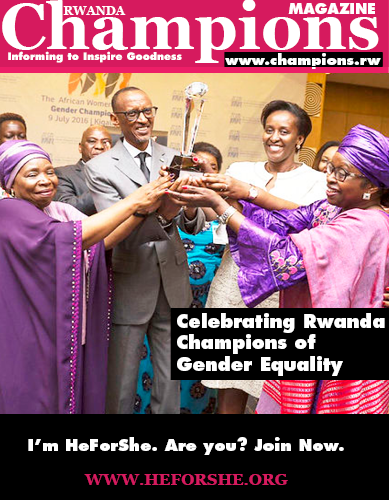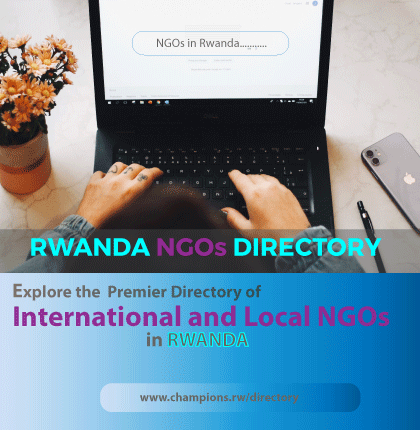Japan Helps Build Rwanda Center for Children With Special Needs
Japan has provided a grant of $89,000 to support the construction of a new facility for children with intellectual (…)

A newly launched project seeks to enhance economic participation of youth with disabilities through cooperatives in Rwanda.
“Turengere Abafite Ubumuga Project” launched by the African Initiative for Mankind Progress Organization (AIMPO), a local Nongovernmental organization in Rwanda on January 26, 2024, is aimed at promoting inclusiveness of persons with (PWDs), through creating an enabling environment for Civil Society Organizations (CSOs) in which the vulnerable groups would realize their own abilities, enhance their participation for economic and social support.
The new project was funded by the European Union and will be implemented by AIMPO in partnership with the Integrated Sustainable Development Organizations (ISDO), Hand in Hand for Development (HIHD) and Organization or Integration and Promotion of Persons with Albinism (OIPPA), targeting to improve the well-being of at least 8,000 persons with disabilities at the end of project.
The target is to strengthen advocacy to capacitate about 30 Civil Society Organizations for rights of persons with disabilities, teach leaders to eliminate discrimination against them and empower parents of children with disabilities for sustainable livelihood.
“We want to raise voice for persons with disabilities to make sure that the society understands their contribution to the economic development. We want to champion their inclusive participation in different areas of opportunities. The history shows that the group used to be neglected in the society due to the stigma. With the project, the efforts will be stretched to beneficiaries for empowering them and building their capacity,” said Richard Ntakirutimana, AIMPO Executive Director.
Among the key activities throughout the project will include capacity building for CSOs and local leaders. Others include training sessions, public awareness events, economic support for youth and community outreach as well as national dialogues.
According to the Executive Director of Organization for Integration and Promotion of Persons with Albinism in Rwanda (OIPPA), Nicodemus Hakizimana, the government of Rwanda has made tremendous strides in supporting and empowering persons with disabilities, compared to the last decades.
He referred the progress to his own testimony. Nicodemus revealed that he holds a PHD degree although he is an albino. He acknowledged that he receives support from the government and individuals that encouraged him to pursue his dreams and attain them.
“Firstly, we thank the government for understanding the challenges facing persons with disabilities as a marginalized group. As a result, it set the law protecting and dignifying them for upholding their rights and consideration in the society. The current constitutional law determines the rights of persons with disabilities and the government ratified the Convention for Rights of Persons with Disabilities (CRPD). This is a tremendous step towards engaging persons with disabilities in all social and political landscapes,” Hakizimana said.
However, Hakizimana called for more efforts to bridge the existing gaps especially in the implementation of the law. For instance, people with are still few in leadership positions of both government entities and private ones.
“We wish to see a mayor, minister or members of parliament with disabilities, so as to reflect an example to others and to inspire fellow persons with disabilities to glow their confidence and tap their potentials,” said Hakizimana.
Critical eye on rural areas
The “Turengere Abafite Ubumuga project” will critically allocate operations mainly to rural areas as they are reported to be prone to discrimination against persons with disabilities.
About 23 sectors, largely from rural areas are set to benefit from the project and evacuate the person disabilities with from the hardships including discrimination.
It is reported that rural areas record high cases of discrimination and injustice against persons with disabilities compared to the cities.
“Several statistics show that all developments are found in the cities compared to the rural areas. This disparity is also evident in the development of persons with where those residing in rural areas suffer the most. But this is a starting point, we plan to scale up even to cities,” Hakizimana further pointed out.
Jean Pierre Baragahoranye who is in charge of Disabilities and Mainstreaming at National Council for Persons with Disabilities (NCPD) urged local leaders to leverage the project for addressing the pressing issues of the persons with disabilities .
“Initiatives such as this should come to help us (public leaders) in tackling issues we have already detected. They shouldn’t come to show us where there are issues” Baragahoranye said.
He stressed the need for leaders to direct civil society organizations to the critical areas where there is need for support to address problems facing persons with disabilities.
Japan has provided a grant of $89,000 to support the construction of a new facility for children with intellectual (…)
People with disabilities in Rwanda are urging the government to ensure the nationwide rollout of digital national (…)
Rwanda will build five model schools for children with complex disabilities beginning in the 2026–27 academic year, (…)
The Rwanda National Union of the Deaf (RNUD) has urged the government to make sign language education accessible to (…)

